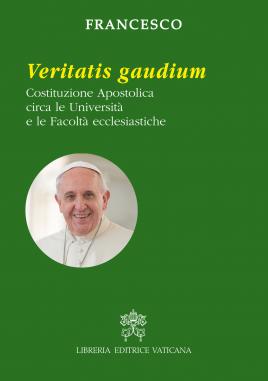Veritatis Gaudium
Pope Francis’ new Apostolic Constitution “Veritatis gaudium” was released today. The strategic role of academic institutions with regard to “leadership” against the backdrop of epochal transformations. “Wide-ranging dialogue” and “creative apologetics” are the guiding lines. New approaches include the issue of migration

“To impart to ecclesasticalal studies that wise and courageous renewal demanded by the missionary transformation of a Church that “goes forth”. It’s the primary goal of the Apostolic Constitution “Veritatis gaudium” , released today – but signed by Pope Francis past December 8 – to reform and update the study program of Catholic Universities and Ecclesastical Universities 39 years after the Constitution “Sapientia Christiana” promulgated by John Paul II in 1979. The expression “cultural revolution” present in the document’s introduction, previously adopted in “Laudato sì”, calls upon academic institutions to address the present “epochal shift” through a global revision put forward by Blessed Henry Newman and Blessed Antonio Rosmini. The prospect indicated by Francis –who quotes from Council documents and “Sapienta Christiana” as well as from Evangelii nuntiandi and Caritas in Veritate in several passages of the text – is “wide-ranging dialogue” with society; the keystone of the “curricula” revision process is a multidisciplinary system.
 Strategic role. Ecclesasticalal studies, reads the new Apostolic Constitution, play a strategic role in the framework of “a resolute process of discernment, purification and reform” demanded by Evangelii gaudium, which the new document is in close continuity with, starting from its title. In fact Francis described the above as “a sort of providential cultural laboratory” that is essential for a Church that goes forth.” In the present “epochal shift”, states the Pope,
Strategic role. Ecclesasticalal studies, reads the new Apostolic Constitution, play a strategic role in the framework of “a resolute process of discernment, purification and reform” demanded by Evangelii gaudium, which the new document is in close continuity with, starting from its title. In fact Francis described the above as “a sort of providential cultural laboratory” that is essential for a Church that goes forth.” In the present “epochal shift”, states the Pope,
“there is need for leadership capable of striking out on new paths”,
to address the anthropological, social and environmental crisis denounced in Laudato si.
“the theologian who is satisfied with his complete and conclusive thought is mediocre”,
cautions Francis, with the reminder that theology, just like philosophy, “is done with an open mind and on one’s knees”, for a good theologian and a good philosopher have an open mind, namely, one that is incomplete and undergoing constant development.
Four criteria. For Francis “we can identify at least four criteria for a renewal and revival of the contribution of ecclesasticalal studies to a Church of missionary outreach.” The first is that of “contemplation” of the mystery, which entails the need to “live the experience the Church as a “mystique” of living together’”, that is, “to allow our hearts and minds to heed the cry of the earth’s poor, and to give concrete expression to the social dimension of evangelization, which is an integral part of the Church’s mission.” The second inspiring criterion is
“wide-ranging dialogue”:
“Not as a mere tactical approach – the Pope specifies – but as an intrinsic requirement for experiencing in community the joy of the Truth and appreciating more fully its meaning and practical implications”, through “authentic culture of encounter” marked by the reciprocal exchange among the different cultures, which entails also the need to “review” academic “curricula.” “Offering, through the various programmes proposed by ecclesiastical studies, a variety of disciplines” is the third criteria, not only within the system of ecclesiastical studies but also in relation to the fragmented panorama of contemporary university studies and to the pluralism of cultural options.
“Networking” between those institutions worldwide that cultivate and promote ecclesiastical studies –the last criterion – in order to set up suitable channels of cooperation also with academic institutions in the different countries and with those inspired by different cultural and religious traditions. t the same time, specialized centres of research need to be established in order to study the epochal issues affecting humanity today and to offer appropriate and realistic paths for their resolution.”
“Creative apologetics”.
Giving shape to a “creative apologetics” remaining faithful to the “borderline”, is the message to ecclesiastical academic institutions. “To think of one world with a common plan” is the indication that stems from Evangelii gaudium, of which the Pope reproposes one of its symbolic images, to be applied also in the relationship between culture and faith: ““the polyhedron, which reflects the convergence of all its parts, each of which preserves its distinctiveness.”
The innovative aspects.
Many operative innovations are contained in the second part of the Apostolic Constitution dedicated to common norms and norms of application for 792 Catholic institutes present worldwide, including ecclesiastical faculties (289) and inherent institutions (503), which are called to adopt revisions and amendments within the next two years. Art. 1 states that Ecclesiastical Universities and Faculties are subject to evaluation by the Holy See’s Agency for the Evaluation and Promotion of Quality in Ecclesiastical Universities and Faculties (AVEPRO). As provided for in the Bologna Process, Ecclesiastical Faculties erected or approved by the Holy See in non-Ecclesiastical universities must observe the prescriptions of the Apostolic Constitution, while respecting the bilateral and multilateral conventions signed by the Holy See with various nations or with the universities. Other innovations include a regulatory framework on distance learning along with “procedures for evaluating the ways to treat the cases of refugees, exiles and persons in similar situations” arriving in our Country without the normal documentation required.